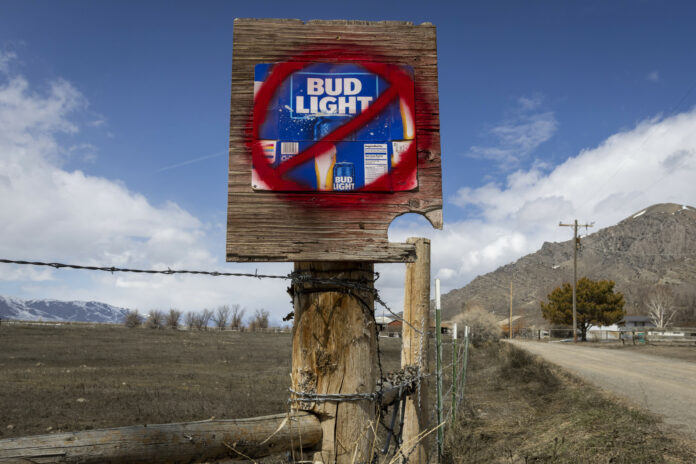Molson Coors has emerged as the unforeseen beneficiary of a nationwide boycott against Bud Light, adding more than $2 billion to its market value since once-loyal patrons jettisoned the blue and white can.
Amidst the cultural maelstrom triggered by Bud Light’s partnership with transgender influencer Dylan Mulvaney in April, which catalyzed a conservative-led crusade to shun the brand, beer drinkers across America are turned to Molson Coors’ lineup of names, driving up sales for the brands, and subsequently, share prices.
The beer conglomerate, known for its flagship Coors Light and Miller Lite, has seen its share prices swell 18.05 percent since the boycotts began on April 1—a number that adds $2.01 billion to the brand’s market value amidst its newfound favor among consumers. Earlier in October, Molson Coors’ CEO Gavin Hattersley declared the surge in market share a “permanent shift,” rather than a temporary blip, indicating that the beer drinkers Bud Light lost may not return to the brand.
Once a ubiquitous presence at sporting events and social gatherings, the brand’s association with Mulvaney struck a discordant chord with a significant portion of its consumer base, triggering a wave that upended long-standing market dynamics and pushed fans of Bud Light to Coors brands.
Coors said in August that combined sales of Miller Lite and Coors Light were 50 percent higher than Bud Light sales in the months following the boycott, leading the company to announce a growth strategy in October that balances marketing with an ‘ear to the ground’ on consumer sentiment, which, according to Hattersley, will allow it to further capitalize on the gap left by Bud Light.
“Over the past few years, long before controversy upended the U.S. beer industry, we changed how we invest, market, and operate, and we changed our future. Today we believe we are built for growth, we expect growth, and we are delivering growth,” Hattersley said in a statement to investors.
The genesis of the consumer exodus can be traced back to a seemingly innocuous marketing move—Bud Light’s collaboration with Mulvaney, aimed at celebrating her transition journey, incited a backlash that rippled through the conservative community. High-profile figures and everyday consumers alike quickly denounced the brand, their actions an emblematic response to the broader political tensions surrounding transgender rights in the U.S.
The financial toll on Anheuser-Busch InBev was immediate. Stock prices plummeted, and Bud Light’s coveted title as America’s preferred beer was swiftly usurped. The furor persisted, with every Bud Light logo, whether at pride events or political rallies, reigniting the flames of contention, Newsweek previously reported.
The boycott’s endurance has been punctuated by a series of public relations missteps and celebrity-led reproaches that have kept Bud Light in the crosshairs of controversy. From NFL stars to music icons, endorsements of Bud Light have been met with outspoken criticism, a clear signal that the boycott’s members remain stricken by the Mulvaney partnership.
Newsweek has reached out to both Anheuser-Busch and Molson Coors via email for comment.
While shares of Anheuser-Busch, Bud Light’s parent company, have largely recovered from the losses seen over the boycott, the stock is down nearly 2 percent over the last five years while Molson Coors is up nearly 10 percent over the same period.
Anheuser-Busch InBev’s Strategic Response to Market Challenges
Natalie Behring/Getty Images
Anheuser-Busch announced in November that its chief marketing officer, Benoit Garbe, will resign at the end of this year. More than that, the company said it has been actively working on restructuring its marketing approach and brand strategy to regain its footing in the market.
One of AB InBev’s key strategies has been to diversify its product portfolio, aiming to reduce over-reliance on any single brand. Its plan includes a renewed focus on introducing new products that cater to a broader range of tastes and preferences, including non-alcoholic beverages and craft beers, which have been gaining popularity among younger consumers.
AB InBev has also been investing in digital transformation initiatives, which are set to enhance consumer engagement through digital platforms, allowing the company to reach a wider audience more effectively and gauge consumer sentiments more accurately.
While the Bud Light boycott was a setback, industry analysts say the company’s resilient approach to navigating consumer preferences and market trends indicates that it is using proactive measures to regain market share from Molson Coors.
Uncommon Knowledge
Newsweek is committed to challenging conventional wisdom and finding connections in the search for common ground.
Newsweek is committed to challenging conventional wisdom and finding connections in the search for common ground.


